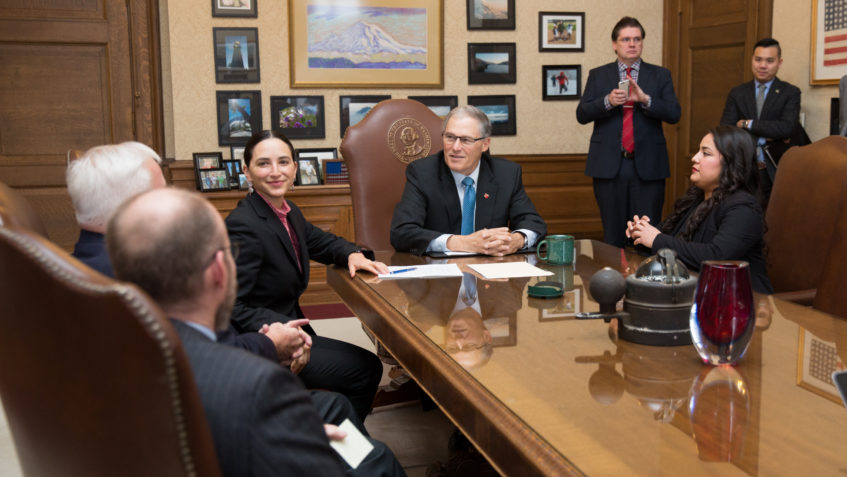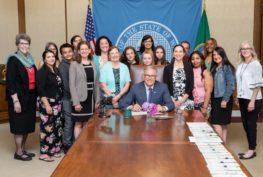The Spokseman-Review / Jan. 21, 2018
By Jim Camden
Less than a day after legislative negotiators pushed them through the House and Senate on bipartisan votes, Gov. Jay Inslee signed key bills on state construction projects and a revision to water law.
It was so fast one had to wonder if the ink was dry yet from printing out the formal copies of the legislation.
A deal that eluded the Legislature for 193 days in the 2017 session came together in the middle of last week. Once an agreement was reached, lawmakers were either so happy to be shed of these troublesome issues or wary that if they delayed even a few hours, the deal would fall apart.
They wasted no time in passing a $4.2 billion capital construction budget, a $2.7 billion general obligation bond bill to help pay for some of those projects, and a complicated set of rules that govern whether and how much water can be drawn from the aquifer in some rural and suburban areas.
“I’m really pleased at the really rapid progress this Legislature is making,” Inslee said.
He signed the capital budget and the bond bills in a standard ceremony in his conference room, serenaded by Senate pages who have formed a ukelele band. The song’s chorus, which lauds legislation with a chorus of “They change the world, one bill at a time” might be worth inscribing over the entrance to the Legislature, he said.
Although he said he wished the Legislature had passed the capital budget much earlier, the budget has projects all over the state, and will support thousands of jobs, he said.
The governor skipped a public signing ceremony for the water rights bill, known generally as the “Hirst fix,” after a state Supreme Court ruling. He signed that one without fanfare in his office earlier. Some of his allies in the environmental community, and many tribal leaders, have criticized it for not doing enough to protect the state’s water resources.
Unlike the capital budget bills, which had near unanimous support in both chambers of the Legislature, the vote on the Hirst fix was mixed, with some of the more liberal and conservative lawmakers voting no.
Signing it in private is just as effective, he said. Asked if there were things he didn’t like about the bill, Inslee replied that is “largely moot” because it’s now law.
It will have a positive effect on the state’s water resources, has more protections for in-stream flows and will spend some $300 million over the next 15 years to improve water supplies, he said.
Voting Rights, and wrongs
Although much attention was given last week to the Legislature’s lightning approval of the $4.2 billion capital construction budget and the change in state water law that freed the spending from the hostage status it was held in through 2017, the Senate also passed another of the Democrats’ Holy Grail bills, the Voting Rights Act.
It’s designed to give minority groups equal opportunity to participate in local elections in cities, counties or other government entities through such things as redistricting or dividing at-large districts into smaller sections of the electorate. If more than 5 percent of those residents speak a language other than English, it also would require those local governments to send out information in that language.
When they were in control of the Senate, Republicans blocked previous efforts. This year, they didn’t have the votes, but they did manage a parliamentary maneuver to stall it for a couple days.
Republicans failed in several efforts to amend it, saying it would lead to lawsuits and gerrymandering. Sen. Rebecca Saldaña, D-Seattle, and others argued it would generate fewer lawsuits.
“I think we currently have right now, over the last census, gerrymandering throughout Washington state,” she said.
That brought a rebuke from Senate Minority Leader Mark Schoesler, R-Ritzville: “I want to correct the gerrymandering comment from the relatively new member of the body. In our state, all four caucuses appoint their negotiator. It is virtually impossible for us to gerrymander our state’s boundaries legislatively.”
Schoesler is right, to a point, but the state is not completely free of gerrymandering for legislative and congressional districts. The redistricting commission has four members appointed respectively by the majority and minority leaders in the House and Senate. But they come to the table trying to get the best deal for the folks who appoint them, and they’ve been known to shift precincts around to make a district safer for one party or the other and draw some pretty strange shapes.
And the bill doesn’t deal with legislative or congressional districts, but local governments.
After a series Republican amendments failed on roll call votes, Saldaña tried to bring it up for a vote without a one-day delay – a standard request that every senator has used at some time. Republicans objected, keeping the vote from happening right away.
Schoesler said Republicans had some members absent to attend the funeral for a Pierce County law enforcement officer and they might want to vote on the bill, too.
Two days later, the bill came to the floor and passed 29 to 19 with some GOP support.






No Comments